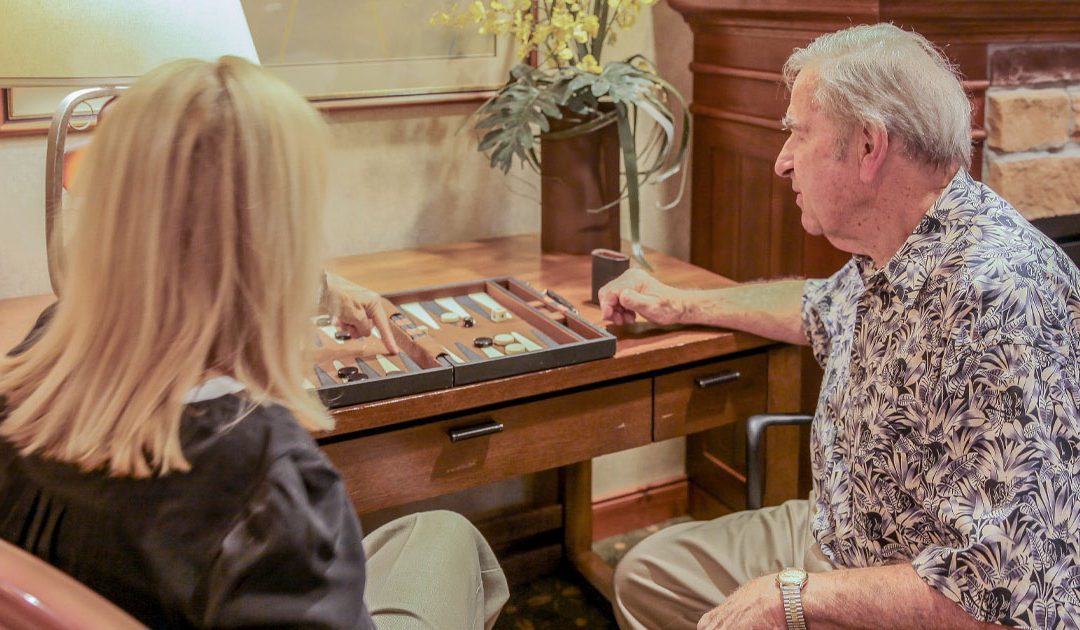People with dementia who exhibit certain kinds of behavior that affect their day-to-day living benefit from living in a memory care unit, Geriatrician, Dr. Elaine Healy says. These are units where staff members are trained in working with people with dementia who require specialized care.
Here are five behaviors or circumstances that can indicate someone needs memory care:
- Changes in behavior.
- Confusion and disorientation that imperils physical safety.
- A decline in physical health.
- A caregiver’s deterioration.
- Incontinence.
1. Changes in behavior.
Some people with dementia may start acting in dramatically different ways. “Someone very independent may suddenly be apprehensive about driving, decline social invitations and become withdrawn,” says. “Someone meticulous about their appearance may suddenly forget daily hygiene or how to do basic tasks like bathing and hairstyling, and are too embarrassed to ask (for help).” A person may become more anxious or agitated.
2. Confusion and disorientation that imperils physical safety.
Dementia can cause confusion and disorientation, which can lead to car accidents. For example, someone with dementia could forget the rules of the road and run through a traffic light. Some people with dementia wander from home on foot and don’t know how to get back. “Someone with dementia symptoms may forget where they’ve walked, and end up somewhere they don’t recognize,” Healy says. “When your loved ones are continually putting their physical safety at risk, it’s time to consider memory care.”
3. A decline in physical health.
“Physical changes are often the first noticeable differences when someone has dementia or Alzheimer’s,” Healy says. If someone becomes thin or frail, it may mean he or she is forgetting to shop for groceries or take medications as directed. Some people with dementia forget to take their prescription medication. And some forget whether they’ve taken their medication and take more than they are supposed to.
4. A caregiver’s deterioration or death.
Some people with dementia are cared for by relatives, often a spouse or significant other. When the caregiver dies or his or her health falters, that often means the spouse or significant other who is being cared for needs a higher level of attention, like memory care, says Dr. Rhonna Shatz, a behavioral neurologist at the University of Cincinnati’s Department of Neurology and Rehabilitation. She’s also an associate professor of neurology and the Bob and Sandy Heimann chair in research and education of Alzheimer’s disease at the University of Cincinnati. In addition, Shatz is the medical director of the Memory Disorders Center at the UC Gardner Neuroscience Institute. Shatz says she recently had a patient with Alzheimer’s whose health seemed to be faltering rapidly. He’d lost weight and was increasingly confused. Shatz identified that his wife, the primary caregiver was impaired. Shatz investigated and learned the wife had developed dementia and was unable to shop and cook for him and make sure her husband took his medications. A daughter then arranged for the couple to move from their home into memory care.
5. Incontinence.
Caregivers can handle a lot, but if incontinence begins to be a big problem, many start to look for memory care, says Dr. R. Scott Turner, professor of neurology and director of the Memory Disorders Program at Georgetown University in the District of Columbia. “They feel overwhelmed, they feel it’s more than they can handle, more than they signed up for,” he says. “It becomes too much.” This can affect both nonprofessional caregivers like family members and hired medical providers who come into the home to provide assistance.
*This blog was originally written and published on US News. You can read the full article here.









